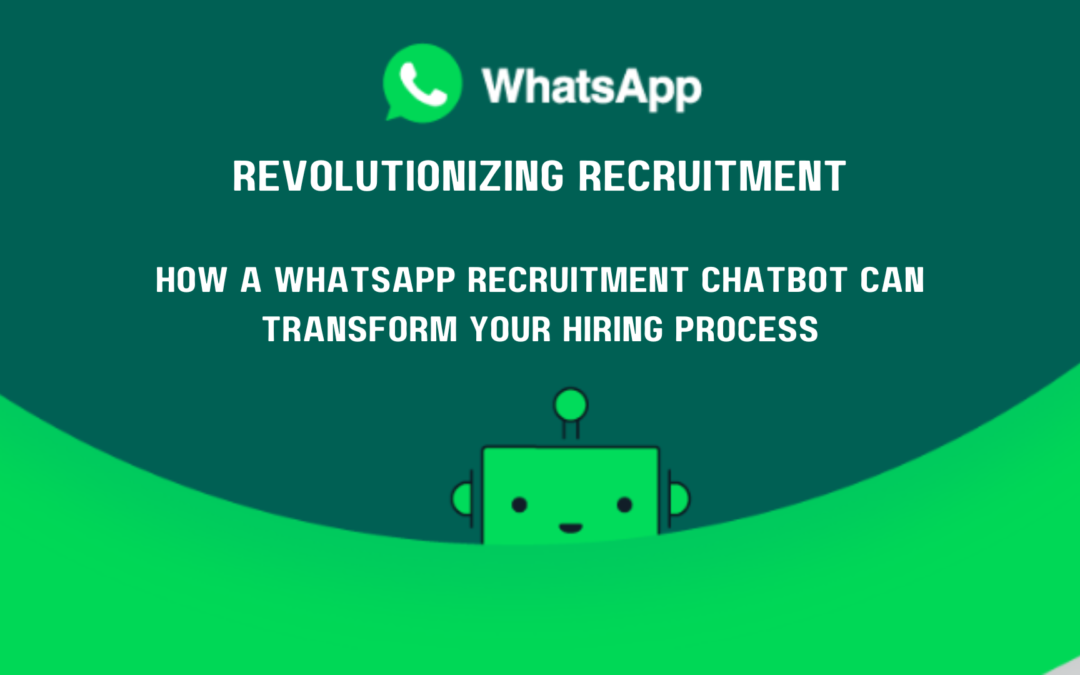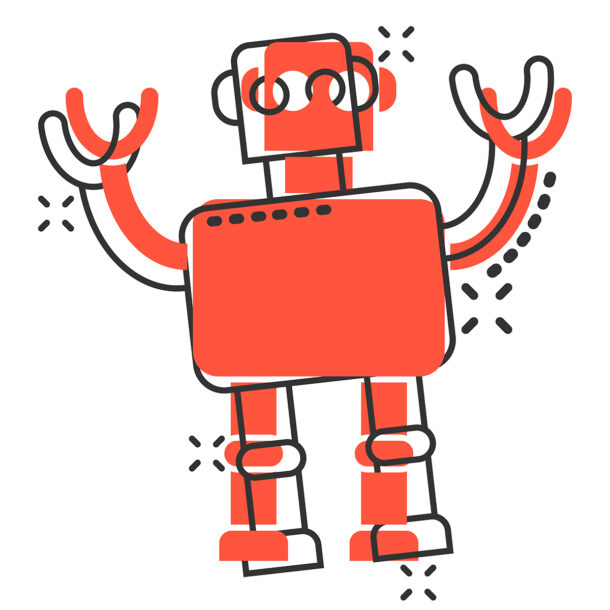Introduction
The digital age has brought forth many challenges in the recruitment sector. Traditional methods like job boards and LinkedIn are being replaced by more innovative solutions to meet the changing needs of recruiters and job seekers. Many organizations now see Revolutionizing Recruitment as a crucial objective in making their hiring processes more efficient.
One important factor in this transformation is technology. Advanced tools and platforms have emerged, providing new ways to overcome recruitment challenges. These technologies not only promise efficiency but also improve the overall experience for candidates and recruiters.
One such innovation is WhatsApp Recruitment Chatbots. These AI-powered tools use artificial intelligence to have conversations with candidates, using technology that understands human language. They can do a variety of tasks, from starting conversations and asking initial questions to helping with job applications, scheduling interviews, and giving updates on feedback.
By automating these tasks, WhatsApp chatbots completely change how hiring works. They offer a cost-effective solution that can be used worldwide because so many people already use WhatsApp for messaging.
In short, a WhatsApp Recruitment Chatbot is more than just a tool; it’s a strategic partner that can completely change how your organization hires new employees. It has the potential to improve your recruitment process by making it more efficient, giving candidates a better experience, and helping your business grow.
The Benefits of Using WhatsApp Chatbots in Recruitment
WhatsApp recruitment chatbots are changing the way hiring works and bringing many advantages.
Key Benefit 1: Enhanced Candidate Experience
WhatsApp chatbots provide a unique opportunity for immediate interaction, giving candidates a sense of being heard and valued. These smart tools can have personalized conversations, making the hiring process smooth and enjoyable for candidates. They can quickly answer questions, give prompt feedback, and update applicants on their application status, all leading to a positive candidate experience.
Key Benefit 2: Improved Efficiency and Productivity
One major benefit of using chatbots in recruitment is their ability to automate time-consuming tasks. They can handle initial screening, schedule interviews, and respond to common queries that recruiters usually handle manually. By automating these tasks, recruiters can spend more time on important activities like finding potential candidates, building relationships, and strategic planning. This not only increases their productivity but also streamlines the overall recruitment process.
Key Benefit 3: Better Quality of Hire
Consistency is crucial when evaluating candidates. WhatsApp recruitment chatbots ensure this consistency through standardized assessments. They use artificial intelligence (AI) algorithms that remove any human bias from decision-making. This fair approach leads to a better quality of hire as it ensures that only the most qualified candidates are chosen based on their skills and qualifications rather than subjective opinions.
As we explore further into using chatbots for recruitment, it’s important to acknowledge the difficulties that may arise and find practical solutions for them.
Overcoming Challenges with WhatsApp Recruitment Chatbots
While WhatsApp recruitment chatbots offer transformative benefits, they also come with their fair share of challenges. One of the main hurdles is their ability to provide accurate and context-aware responses, which is crucial for meaningful interactions with candidates.
1. Addressing the Challenge of Accurate and Context-Aware Responses:
To ensure that the chatbot is able to consistently provide relevant and precise information, it’s important to have a strategy in place for continuous improvement. Here are some key steps:
- Regular Training: Keep updating the chatbot’s knowledge base with new information and insights gained from previous interactions.
- Algorithm Monitoring: Analyze chatbot conversations to identify any areas where it might be struggling to understand human language nuances, and then make necessary adjustments to its algorithms.
- Feedback Loops: Create channels for candidates to rate the chatbot’s responses, which can serve as valuable data for improving its conversational abilities.
2. Balancing Automation with Human Touch in Candidate Interactions:
While chatbots have come a long way in terms of their capabilities, there are still certain situations where they might not be able to fully meet the needs of candidates who require empathy or more in-depth understanding. To address this issue:
- Hybrid Bot-Human Models: Design workflows in such a way that the chatbot can seamlessly transfer the conversation to a human recruiter whenever it encounters questions or concerns that are beyond its scope.
- Escalation Triggers: Set up predefined conditions that trigger a smooth transition from the chatbot to a human, without causing any disruption to the candidate’s experience.
- Human Oversight: Ensure that there are mechanisms in place for human recruiters to actively supervise chatbot conversations and intervene whenever necessary.
By implementing these strategies effectively, organizations can make the most out of WhatsApp recruitment chatbots by leveraging their efficiency, while also mitigating any potential drawbacks. The ultimate goal is to establish a harmonious relationship between the capabilities of AI and the expertise of humans in the recruitment process.
The Future Landscape of Recruitment: Leveraging Advanced Technologies like WhatsApp Chatbots
Future Trends and WhatsApp recruitment chatbots are two common topics when discussing the evolution of recruitment technology. Here are two emerging trends that are shaping this landscape:
Emerging Trend 1: Advancements in Natural Language Understanding (NLU) Capabilities
The sophistication of Natural Language Understanding (NLU) models has significantly advanced, reshaping the interaction landscape between chatbots and users. NLU is a subset of artificial intelligence (AI) that equips chatbots with the understanding and interpretation of human language within context. With these advancements, WhatsApp recruitment chatbots can now comprehend and respond to user inputs conversationally and contextually.
Technological strides in NLU capabilities have made it possible for chatbots to engage candidates more naturally, thereby enhancing the candidate experience. They interpret user inputs accurately, understand intentions, manage multiple topics within a conversation, and even handle ambiguous or complex queries.
Emerging Trend 2: Integration with Other HR Technologies for Seamless Data Exchange
The future of recruitment also lies in the efficient integration of WhatsApp recruitment chatbots with existing HR systems. This integration enables seamless data exchange throughout the employee lifecycle.
Incorporating WhatsApp chatbots into systems such as applicant tracking software and onboarding platforms can significantly streamline HR processes. This integration ensures that all candidate information is centrally stored, easily accessible, and updated in real-time.
Through seamless data exchange, HR professionals can make prompt and informed decisions, ultimately improving the quality of hire and overall efficiency of the recruitment process.
Case Studies: Real-World Examples of Organizations Transforming Their Hiring Process with WhatsApp Recruitment Chatbots
Case Study 1: Global Tech Inc.
Challenge: Global Tech Inc., an international software company, faced difficulties in managing high-volume recruitment drives across different time zones, leading to delayed responses and a diminished candidate experience.
Solution: The organization implemented a WhatsApp recruitment chatbot, designed to provide instant engagement and support candidates throughout various stages of the hiring process.
Strategies Implemented:
- Automated pre-screening to filter candidates based on essential criteria
- Real-time notifications to keep applicants informed about their application status
- Integration with the company’s ATS for streamlined data management
Case Study 2: HealthCare Prodigy
Challenge: HealthCare Prodigy, a network of hospitals, struggled with coordinating shift schedules and location preferences for nursing staff, resulting in staffing shortages and operational disruptions.
Solution: A customized WhatsApp recruitment chatbot was developed to match nursing professionals with suitable shifts promptly and efficiently.
Strategies Implemented:
- Dynamic scheduling assistant capable of understanding candidates’ availability and preferences
- Immediate FAQ resolution to address common queries regarding shifts and locations
- Seamless transition from chatbot to human HR representative for complex issues
Case Study 3: Retail Giant Group
Challenge: Retail Giant Group needed to enhance its hiring strategy for seasonal workforce expansions, ensuring it attracted qualified candidates quickly without sacrificing the quality of hire.
Solution: By leveraging a WhatsApp recruitment chatbot, the group was able to engage potential employees at scale while maintaining a personalized approach.
Strategies Implemented:
- Targeted broadcast messages announcing new job openings
- Interactive chat flows guiding candidates through the application process
- Personalized job recommendations based on previous interactions and expressed interests
Each case study underscores the versatility of WhatsApp recruitment chatbots in addressing industry-specific challenges by automating key tasks, enhancing communication efficiency, and providing actionable insights into candidate engagement.
Key Considerations for Implementing a Successful WhatsApp Recruitment Chatbot Strategy
When thinking about adding a WhatsApp recruitment chatbot to your hiring process, there are several important steps you should take to make sure it works well and brings value.
Step 1: Assessing Your Current Recruitment Process and Identifying Automation Opportunities
- Carefully examine each step of your current recruitment process to find out where automation can make the biggest difference in terms of efficiency.
- Pay special attention to tasks like screening candidates before interviews and sending follow-up messages after applications, as these are great candidates for automation. This will free up your human resources for more important work.
Step 2: Selecting the Right Platform or Technology Provider for Building Your WhatsApp Chatbot Solution
- Choose a platform that not only has powerful tools for building chatbots but also makes it easy to connect with the WhatsApp Business API.
- Make sure the platform you choose follows WhatsApp’s strict guidelines and can handle future growth and changes smoothly.
Step 3: Defining Chatbot Capabilities and User Interactions through Conversational Design
- Create a chatbot design that is easy to understand and use, while also reflecting your brand’s personality.
- Use techniques like mapping out message flows and developing user personas to create interactions that candidates will find engaging and meaningful.
Step 4: Testing and Iterating Your Chatbot Prototype to Ensure Optimal Performance
- Put your chatbot through rigorous testing, trying out different scenarios to uncover any issues or problems with how it works.
- Gather feedback from users and make improvements to your chatbot based on their input, constantly refining its performance until it meets your standards for candidate interaction.
By following these steps carefully, companies can make sure their WhatsApp recruitment chatbot is a valuable tool in finding the best talent.
Potential Applications of WhatsApp Chatbots in Other HR Functions
WhatsApp chatbots are not just transforming recruitment; they extend their capabilities across various HR functions. The automation of repetitive tasks and the provision of self-service HR assistance through these intelligent systems can lead to significant efficiency gains in areas such as:
1. Onboarding
Automating the onboarding process with WhatsApp chatbots ensures that new hires receive timely information and guidance. These chatbots can distribute onboarding materials, answer common questions about company policies, and collect necessary paperwork without human intervention.
2. Leave Management
Employees often have queries regarding leave balances and company leave policies. A chatbot can manage these inquiries by integrating with the organization’s leave management system, providing instant responses to leave requests, and updating leave records accordingly.
3. Training Delivery
Personalized learning experiences are crucial for employee development. Chatbots on WhatsApp can schedule training sessions, send reminders for upcoming modules, and even deliver microlearning content directly to employees’ phones.
By deploying WhatsApp chatbots in these areas, organizations can ensure that their HR teams are freed up from routine tasks, allowing them to focus on more strategic initiatives that require a human touch. The use of chatbots also enhances the employee experience by providing them with instant access to information and support, fostering a more responsive and engaged workforce.
Conclusion
Revolutionizing Recruitment with a WhatsApp Recruitment Chatbot has emerged as a game-changing approach to modern hiring processes. By automating repetitive tasks, personalizing candidate interactions, and using data-driven insights, these AI-powered tools can greatly improve operational efficiency and candidate experience.
Embracing this technology can benefit recruiters and HR professionals in various ways:
- Reduced time spent on manual, time-consuming tasks
- Improved quality of hires through unbiased, systematic evaluations
- Enhanced candidate experience due to real-time engagement and personalized communication
Consider the opportunities that this advanced technology brings to your own recruitment efforts. The journey toward a streamlined, efficient hiring process awaits. Maximize the limitless potential of AI and chatbots to drive your business forward.
If you’d like to find out more about how We Are Gabba can help your recruitment needs, book a demo here.


